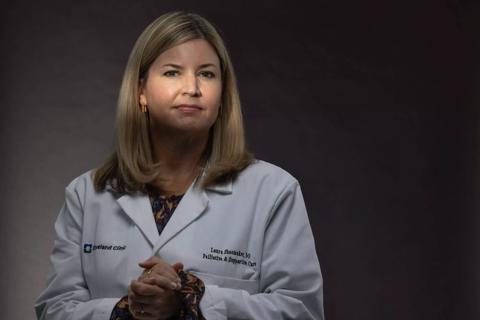Expanded prenatal DNA testing has arrived in the form of a double-edged sword

Advertisement
Cleveland Clinic is a non-profit academic medical center. Advertising on our site helps support our mission. We do not endorse non-Cleveland Clinic products or services. Policy
Advances in prenatal genetic tests provide pregnant women and their doctors with specific medical information to inform key prenatal care decisions. While these tests have the potential to provide women with valuable information about their pregnancy, the tests can also provide information that they may not be prepared to learn about or perhaps did not want to access during their pregnancy.
Obstetricians work closely with patients to help them choose the prenatal testing options that best meet the patient’s needs, values and goals. However, the influx of new tests, technology and information presents unique challenges to obstetricians in this role.
Cell-free fetal DNA screening, also known as noninvasive prenatal testing (NIPT), is a prime example. This screen provides more accurate information about the risk of conditions such as trisomies 21, 18 and 13 than is available from conventional screens.
NIPT can also provide information about the risk of a series of other chromosomal and genetic abnormalities that previously only could be learned using procedures such as chorionic villus sampling or amniocentesis.
This leads many to question how best to help pregnant patients decide if and how to use these tests, and what choices to make about the pregnancy once they have that information. The decision-making process is not straightforward.
The decision to use a test like NIPT is a personal one for patients. Part of the decision-making process involves the patient learning about the various conditions screened for and what the test can tell her about those conditions. Patients must decide if and how this information aligns with their values, goals and needs, because they are in the best position to make that decision. It is our job to provide our patients with the information and support they need to make choices.
Advertisement
Autonomy is a core issue in the use of prenatal genetic testing. Giving patients autonomy enables them to make a decision that truly reflects their needs, values and priorities — and not those of the healthcare team — particularly when the pregnancy is complicated by a fetal anomaly.
My colleagues at The Hastings Center* and I discuss the importance of autonomy and concerns about maintaining it in this era of advances in prenatal genetics in a paper published in the New England Journal of Medicine. Together, we present a picture about a future in which a woman’s autonomy could be at risk, while providing hope and promise that this outcome will not occur.
It was a privilege to work with Josephine Johnston, LLB, MBHL, and Erik Parens, PhD, and add our respective expertise in patient care and ethics to this important discussion. As a physician-researcher, I was able to bring my dedication to advocating for patients and healthcare providers as they encounter new genetic technologies.
While I hear the voices of individual patients every day, my research on medical decision-making and genetic testing helps me speak to larger groups of women who face such difficult decisions. This line of research, funded by the National Institutes of Health and March of Dimes, focuses on how to best educate patients and providers about new prenatal genetic tests and, more importantly, how to have effective conversations that support patients’ decision-making.
It is imperative that every woman has the information and support needed to make the best decisions for herself and her family. Advances in genetic technology are happening at breakneck speed, and physicians and patients can easily get caught in the middle.
Advertisement
Prenatal genetic counselors have traditionally played a key role in this process. However, at this time there are simply not enough genetic counselors to meet the needs of all patients considering prenatal testing, particularly as tests such as NIPT become readily available across the general obstetric population. Without adequate resources to learn about their testing choices, many women will find themselves on a decision pathway they aren’t yet ready to face.
The studies I have conducted demonstrate that pregnant women do want to understand the benefits and risks of various prenatal tests and be reassured that foregoing testing is an acceptable choice.
These studies also show that physicians want to be able to present this information and support to patients and their families. However, they confront many challenges along the way. It will be critical to coordinate efforts across multiple disciplines to ensure that the decision-making and consent processes take place in a way that empower patients, without leaving them at a loss for how to make the best choice about their testing options and, ultimately, the pregnancy and their family.
This will require collaboration between the industry developing these tests, professional organizations developing testing guidelines and front-line health professionals, including obstetricians, maternal-fetal medicine specialists, pediatricians, genetic counselors and bioethicists who are providing care.
This may seem like a daunting task. Yet, it is critical that we work together and not become overwhelmed by the task ahead as we actively move forward on all fronts.
Advertisement
*The Hastings Center, founded in 1969, is a renowned bioethics research institute located in the Hudson Valley, north of New York City.
Dr. Farrell has a special interest in reproductive bioethics. She is Vice Chair of Clinical Research for the Ob/Gyn & Women’s Health Institute.
Advertisement
Advertisement

In rehabilitation medicine, the answer might require nuance

Mental health colleagues can provide much-needed perspective

Palliative care specialists know hard conversations can also be valuable ones

Variables affect nuances of the conversation

Authors discuss ethical challenges associated with sponsored genetic testing

Program focuses on nurturing ethics leaders in daily practice

Medical, ethical and legal considerations

An end-of-life dilemma in the intensive care unit